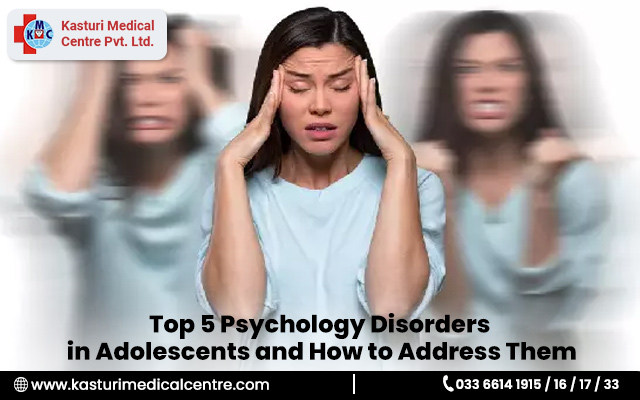Adolescence is an essential stage of change and development marked by profound physical, emotional, and psychological changes. It is also a time when many psychological disorders can emerge. Identifying and addressing your issues early is crucial for supporting the mental health of teenagers.
Psychological disorders in adolescents and strategies to manage them effectively
Anxiety Disorders
The anxiety disorders that are common among teenagers include Generalized Anxiety Disorder (GAD), Social Anxiety Disorder, and panic disorder. Possible symptoms include continuous worry, restlessness, and physical complaints like headaches or stomach aches.
Here are the ways to address it:
- Therapy: To help adolescents identify and challenge anxious thoughts and behaviours, Cognitive Behavioural Therapy (CBT) is necessary.
- Support: Always encourage open conversations about your fears and anxieties. Family and friends’ support can comfort you.
- Lifestyle Changes: You need to promote regular exercise, healthy eating, and adequate sleep, all of which can reduce anxiety levels.
Depression
Depression in adolescents includes prolonged sadness, loss of interest in activities, changes in sleep or appetite. Sometimes thoughts of self-harm. It is more than just a phase and requires serious attention.
Here are the ways to address it:
- Therapy: Both CBT and Interpersonal Therapy (IPT) are crucial for adolescents to manage their symptoms by addressing negative thought patterns and improving relationships.
- Medication: In some cases, antidepressants may be prescribed by a psychiatrist if required.
- Family Support: This is very important as living in a supportive environment and maintaining open communication can help adolescents feel understood and less isolated.
Attention deficit/hyperactivity disorder
ADHD has some common symptoms, which include inattention, hyperactivity, and impulsiveness. These symptoms can affect academic performance and social relationships.
Here are the ways to address it:
- Behavioural Therapy: This helps adolescents to develop organizational skills and coping strategies.
- Medication: Healthcare professionals may prescribe stimulants and non-stimulants to help manage symptoms.
- Structured Environment: Creating a structured routine and breaking tasks into manageable parts can help improve focus and productivity.
Eating disorders
Eating disorders are severe conditions caused by unhealthy eating habits and preoccupation with weight and body image. The conditions include Anorexia Nervosa, Bulimia Nervosa, and Binge-eating disorder.
Here are the ways to address it:
- Specialized Therapy: For addressing the psychological disorders and physical aspects of eating disorders, several therapies like nutritional counselling combined with therapies like CBT or Family-Based Therapy (FBT) are essential.
- Medical Supervision: Regular medical check-ups are necessary to monitor the physical health of adolescents with eating disorders.
- Support Groups: Encourage participation in support groups, which can provide comfort and understanding to peers facing similar challenges.
Substance use disorders
Adolescents are nowadays at risk for developing substance use disorders, which can include the misuse of alcohol, prescription medications, or recreational drugs. This can lead to severe health and social problems.
Here are the ways to address it:
- Rehabilitation Programs: This includes professional treatment programs like counselling, therapy, and medical support, which are crucial.
- Family Involvement: Family therapy can also help address underlying issues and improve communication and support within the family.
- Education and Prevention: It is necessary to educate adolescents about the risks of substance abuse and promote healthy coping strategies to help them prevent the development of substance use disorders.
If you suspect that any adolescent is facing or struggling with psychological disorders, seek help from Kasturi Medical Centre to make sure they receive the appropriate care and support.

